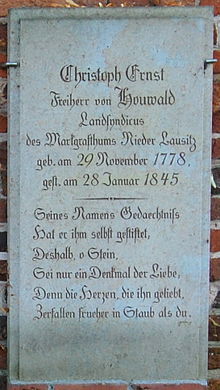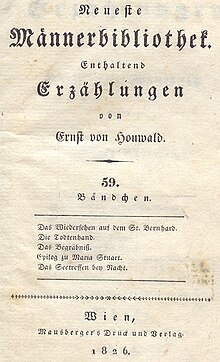Ernst von Houwald
Ernst Christoph Freiherr von Houwald (born November 29, 1778 in Straupitz / Spreewald; † January 28, 1845 in Lübben ) was a German writer and playwright from the von Houwald family .
origin
His parents were Wilibald von Houwald (1739–1799) and his wife Auguste von Knoch (1747–1815). His father was an electoral judge for the margraviate of Niederlausitz .
Life
Houwald visited the Pädagogium Halle, studied at the university there, then cameralistics (right) and received 1,802 in feudal service of his province a job. When the new organization of Lower Lusatia, which had fallen to Prussia, hampered its effectiveness in 1815, he retired to his parents' estate in Straupitz , where he was involved in managing the business.
In 1806 he married Auguste von Haberkorn, with whom he lived at Sellendorf Castle from 1806 and raised nine of his own children and three foster children. 1822 Niederlausitzer stands of Houwald chose to land Counsel , and he to Schloss Neuhaus at Luebben moved, where he lived until his death 1845th From 1816 his childhood friend Karl Wilhelm Salice-Contessa (the younger) lived with him on Neuhaus. Both had already written their first works during their joint studies in Halle. In 1818, Houwald's first work was Romantic Accorde . The Homecoming was the first of his works, which was premiered in Dresden in 1818.
Under Houwald, Neuhaus developed into a court of muses. So were Bettina and Achim von Arnim , Adelbert von Chamisso , Emanuel Geibel , Friedrich de la Motte Fouqué , Franz Grillparzer and Ludwig Tieck as guests.
In 1826, Houwald managed to win over Karl Friedrich Schinkel to build the new village church in Straupitz.
After his death at Neuhaus Castle, he was buried on the north side of the Steinkirchen village church , where his gravestone is still to this day.
plant
He had already published some poems under a strange name before; but he only turned to poetry from 1815 and left his stories, Romantic Chords (Berlin 1817, 2 volumes), the book for children of educated classes (Leipzig 1819–1824, 3 volumes), the pictures for the youth (Leipzig 182x – 1832, 3 volumes) and stories (Dresden 1829) follow.
However, it owed its reputation, in keeping with the taste of the time, to its fate tragedies, among which Der Leuchtturm (with another, smaller tragedy: Die Heimkehr , Leipzig 1821) and Das Bild (Leipzig 1821, new edition 1822) are light and lyrical full-fledged verification received the most applause. This subheading also includes: Die Freistatt (Leipzig 1820), Curse and Blessing (Leipzig 1821), The Enemies (Leipzig 1825) and The Pirates (Leipzig 1830). The occasional play Der Fürst und der Bürger (Leipzig 1823) and the comedy Die alten Spielkameraden (Weimar 1823) are of lesser importance .
Houwald's Complete Works appeared in five volumes (Leipzig 1858/59).
A literary reflection on the life and work of Ernst von Houwald can be found in the volume Versions II by Gerd Hergen Lübben .
literature
- Siegfried Kohlschmidt: Ernst von Houwald (1778-1845). Picture book for the poet's 225th birthday (= treasures from the Museum Schloss Lübben - treasures, No. 2), Regia Verlag, Cottbus 2003, ISBN 3-936092-91-5
- Joseph Kürschner : Houwald, Ernst Christoph Freiherr von . In: Allgemeine Deutsche Biographie (ADB). Volume 13, Duncker & Humblot, Leipzig 1881, p. 212 f.
- Rudolf Lehmann : Houwald, Ernst von. In: New German Biography (NDB). Volume 9, Duncker & Humblot, Berlin 1972, ISBN 3-428-00190-7 , p. 662 f. ( Digitized version ).
Individual evidence
- ^ Neuhaus in Lübben - literary sites Berlin / Brandenburg - literary landscape. Retrieved May 6, 2020 .
- ↑ Kristin Jaath: Brandenburg: On the way between Elbe and Oder . 4th edition. Trescher, 2017, p. 315 .
- ↑ See »ANWANDLUNGEN │ VON HOUWALDS SPUK AUS VERGANGNEM« in: Gerd Hergen Lübben, VERSIONS II | "Lübbener Vortex • Wurten • In the open", "Something to write • Celan • Old Ez", "RWE Olé • Delic bodies • Matwich" and other texts , 2014, ISBN 9783955778002 .
Web links
- Literature by and about Ernst von Houwald in the catalog of the German National Library
- Works by and about Ernst von Houwald in the German Digital Library
| personal data | |
|---|---|
| SURNAME | Houwald, Ernst von |
| ALTERNATIVE NAMES | Houwald, Ernst Christoph Freiherr von |
| BRIEF DESCRIPTION | German writer and playwright |
| DATE OF BIRTH | November 29, 1778 |
| PLACE OF BIRTH | Straupitz |
| DATE OF DEATH | January 28, 1845 |
| Place of death | Luebben |



